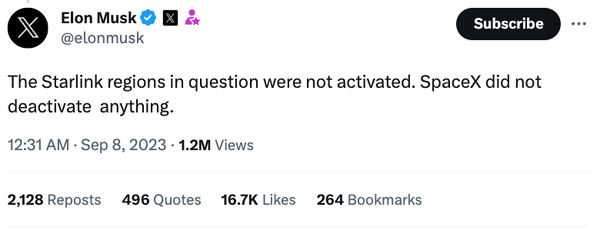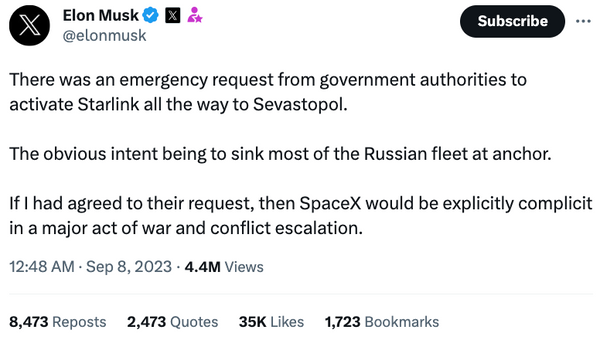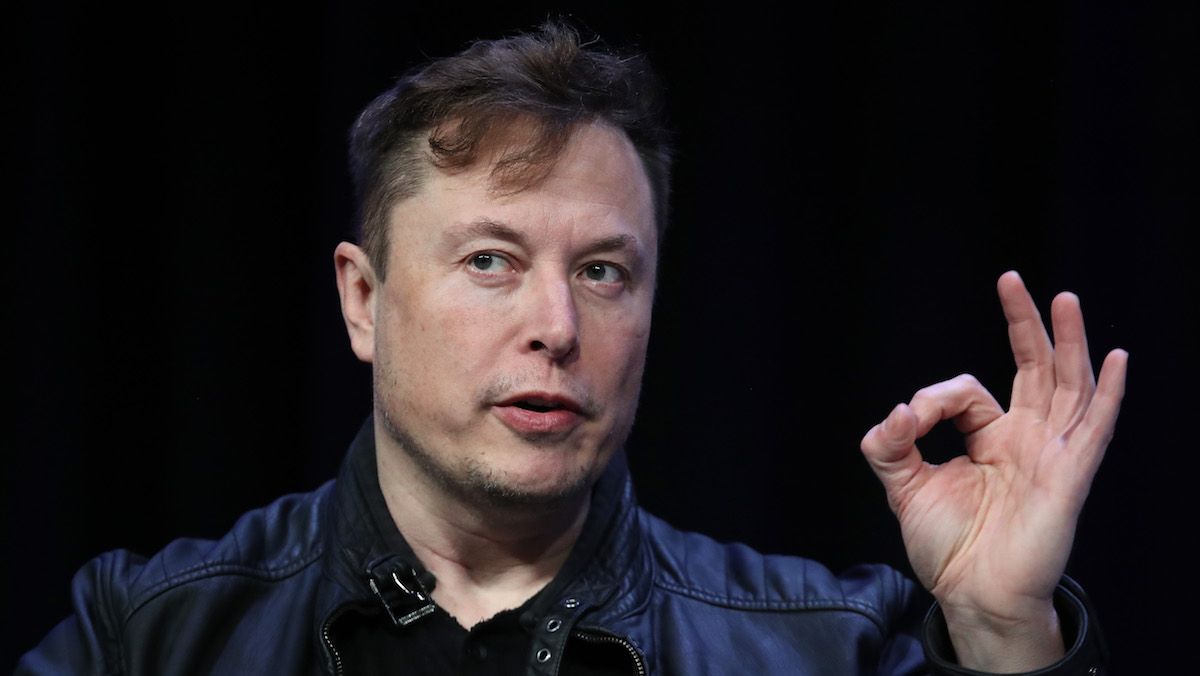Editor's note: This article has been expanded to include Musk's remarks at the All-In Summit on Sept. 11, 2023, pertaining to Starlink, Crimea and the role he says U.S. sanctions against Russia played in his decision-making.
In September 2023, allegations spread online that Elon Musk secretly shut down access to Starlink — a satellite internet system operated by Musk's aerospace company SpaceX — in Crimea, Ukraine, the previous year, supposedly to prevent a surprise attack by the Ukrainian military on Russian forces. Musk later responded to the allegations in a thread on X (formerly Twitter) and, eventually, at a technology conference.
The claims stemmed from a CNN article published on Sept. 7, 2023, citing an excerpt from a yet-to-be-released book about Musk by author Walter Isaacson.
CNN: Elon Musk secretly shut down Starlink access off the coast of Crimea last year to thwart Ukraine's underwater USV attack on the Russian Navy. The USVs, filled with explosives, had already approached the Russian fleet, but suddenly "lost contact and harmlessly washed ashore."
byu/PatientBuilder499 inUkrainianConflict
That same day, The Washington Post published a column written by Isaacson himself containing details similar to the CNN article. Various other reputable news outlets, including The Guardian and The New York Times, then published their own headlines about Musk allegedly telling engineers "to turn off communications network to hobble Ukraine drone attack on Russian warships."
The New York Times described Starlink as "a digital lifeline in Ukraine since the early days of the war for both civilians and soldiers in areas where digital infrastructure has been wiped out."
The CNN Article and Musk's Response
Here's an excerpt from CNN's article, which was titled, "CNN Exclusive: 'How am I in this war?': New Musk biography offers fresh details about the billionaire's Ukraine dilemma":
Elon Musk secretly ordered his engineers to turn off his company's Starlink satellite communications network near the Crimean coast last year to disrupt a Ukrainian sneak attack on the Russian naval fleet, according to an excerpt adapted from Walter Isaacson's new biography of the eccentric billionaire titled "Elon Musk."
As Ukrainian submarine drones strapped with explosives approached the Russian fleet, they "lost connectivity and washed ashore harmlessly," Isaacson writes.
Musk's decision, which left Ukrainian officials begging him to turn the satellites back on, was driven by an acute fear that Russia would respond to a Ukrainian attack on Crimea with nuclear weapons, a fear driven home by Musk's conversations with senior Russian officials, according to Isaacson, whose new book is set to be released by Simon & Schuster on September 12.
Musk's concerns over a "mini-Pearl Harbor" as he put it, did not come to pass in Crimea. But the episode reveals the unique position Musk found himself in as the war in Ukraine unfolded. Whether intended or not, he had become a power broker US officials couldn't ignore. [...]
After Russia disrupted Ukraine's communications systems just before its full-scale invasion in February 2022, Musk agreed to provide Ukraine with millions of dollars of SpaceX-made Starlink satellite terminals, which became crucial to Ukraine's military operations. Even as cellular phone and internet networks had been destroyed, the Starlink terminals allowed Ukraine to fight and stay connected.
Musk did not respond to CNN's request for comment, according to the article.
After the allegations about Musk shutting off Starlink in Crimea took off online, however, he responded on X (formerly Twitter). In a series of messages, he claimed the following: (1) Starlink was never activated in the region in the first place, and therefore he never deactivated it, and (2) the Ukrainian government had asked him to activate Starlink "all the way to Sevastopol," the largest city in Crimea, and he refused to do that to avoid escalating the conflict.

(@elonmusk on X)

(@elonmusk on X)
The New York Times interpreted Musk's clarifications as a tacit acknowledgment of his intent (emphasis ours):
[...] Mr. Musk responded on his social media platform to say that he hadn't disabled the service but had rather refused to comply with an emergency request from Ukrainian officials to enable Starlink connections to Sevastopol on the occupied Crimean peninsula. That was in effect an acknowledgment that he had made the decision to prevent a Ukrainian attack.
After Musk's tweets, Mykhailo Podolyak, an adviser to Ukrainian President Volodymyr Zelenskyy, tagged the billionaire in a post on X that claimed "civilians, children are being killed" because of the unavailability of Starlink's services.
Isaacson, whose book excerpt was the basis of CNN's initial report, issued his own clarification on Sept. 8, acknowledging that Starlink had not been enabled in Crimea in the first place:
To clarify on the Starlink issue: the Ukrainians THOUGHT coverage was enabled all the way to Crimea, but it was not. They asked Musk to enable it for their drone sub attack on the Russian fleet. Musk did not enable it, because he thought, probably correctly, that would cause a major war.
Then, during the All-In Summit that took place on Sept. 10-12, 2023, Musk again addressed the topic of Starlink access in Crimea. The recording from Musk's speech at the conference was shared on Sept. 13, 2023, on the All-In Podcast YouTube channel:
Musk now claimed that at the time of the in-question situation, Starlink access around Crimea was not turned on. The reason was because the U.S. had imposed sanctions on Russia, and SpaceX was not allowed to turn on connectivity in Crimea without explicit government approval. Moreover, Musk said, Ukraine didn't give SpaceX any "advance warning or heads up." He said he got urgent calls from the Ukrainian government in the middle of the night saying that he needed to turn on Starlink access in Crimea.
Comparing the situation to the Japanese attack on Pearl Harbor in 1941, Musk claimed that the Ukrainian government was asking SpaceX to "proactively take part in a major act of war." He said that SpaceX was supporting Ukraine, but the Ukrainian government was not in charge of U.S people or companies, adding "that's not how it works." He added that although he's not U.S. President Joe Biden's biggest fan, if he had received a presidential directive to turn on Starlink connectivity in Crimea, he would have done so, because he does "regard the president as the chief executive officer of the country." But no such requests came through, he said.
We have reached out to the U.S. Department of Treasury for confirmation that the existing U.S. sanctions would prohibit activating Starlink access in Crimea, but as of this writing, we have not received a reply. Moreover, we contacted Mykhailo Fedorov, deputy prime minister for innovation, education, science and technology development and minister of digital transformation of Ukraine, and we will update this article if or when we receive a response.
The Book That Prompted CNN's Article
This is the description of "Elon Musk" by Walter Isaacson on publisher Simon & Schuster's website:
From the author of Steve Jobs and other bestselling biographies, this is the astonishingly intimate story of the most fascinating and controversial innovator of our era—a rule-breaking visionary who helped to lead the world into the era of electric vehicles, private space exploration, and artificial intelligence. Oh, and took over Twitter.
The biography, as the description continued, documents two years of encounters between Isaacson and Musk:
For two years, Isaacson shadowed Musk, attended his meetings, walked his factories with him, and spent hours interviewing him, his family, friends, coworkers, and adversaries. The result is the revealing inside story, filled with amazing tales of triumphs and turmoil, that addresses the question: are the demons that drive Musk also what it takes to drive innovation and progress?
Snopes reached out to Isaacson for more details about Musk, Starlink and Crimea, but we have not received a reply.
